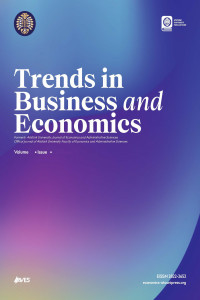BİLİŞİM TEKNOLOJİSİ TUTUMLARI FARKLI ÜNİVERSİTE PERSONELİNİN BİLİŞİM TEKNOLOJİSİ BECERİLERİNİN DEĞERLENDİRİLMESİ
Bu araştırmada bilişim teknolojisi (BT) tutumları farklı olan üniversite personelinin BT becerileri çeşitli değişkenlere göre incelenmiştir. Araştırmanın örneklemini 2007 yılında İnönü Üniversitesi’nde çalışan 496 personel oluşturmuştur. Veriler; “BT Beceri Ölçeği”, “BT Tutum Ölçeği” ve Kişisel Bilgi Formu ile elde edilmiştir. Verilerin çözümlenmesinde İki Yönlü Varyans Analizi ve Tukey testi kullanılmıştır. Sonuç olarak; BT tutumu, cinsiyet, yaş, eğitim, kadro, yabancı dil ve çalışılan birimin BT becerisine temel etkileri anlamlı bulunmuştur. Ayrıca, BT tutumuyla yabancı dilin ortak etkilerinin anlamlı olduğu görülmüştür.
Anahtar Kelimeler:
BT, BT becerisi, BT tutumu, İnönü Üniversitesi personeli
___
- Al-Khaldi, M. A. ve Al-Jabri, M. (1998), “The Relationship of Attitudes to Computer Utilization: New Evidence from A Developing Nation”, Computers in Human Behavior, 14(1), pp. 23-42.
- Berberoğlu, G. ve Çalıkoğlu, G. (1993), “Factorial Validity of the Turkish Computer Attitude Scale”, Studies in Educational Evaluation, 19, pp. 257-263.
- Brosnan, M. (1998), “A Cross-Cultural Comparison of Gender Differences in Computer Attitudes and Anxieties: The United Kingdom and Hong Kong”, Computers in Human Behavior, 14(4), pp. 559-577.
- Chen, M. V. (2005), Adult Students Information Technology Experience and Attitudes toward Use of Computers Technology, Unpublished Doctoral Thesis, Mississippi University.
- Committe on Information Technology Leteracy, (1999), Being Fluent with Enformation Technology, National Academy Press, Washington.
- Jankowska, M.A. (2004), “Identifying University Professors’ Information Needs in the Challenging Environment of Information and Communication Technologies”, The Journal of Academic Librarianship, 30(1), pp. 51-66.
- Laguna, K. ve Babcock, R. L. (1997), “Computer Anxiety in Young and Older Adults: Implications for Human-Computer Interactions in Older Populations”, Computers in Humans Behavior, 13(3), pp. 317-326.
- Meelissen, M. R. M. ve Drent, M. (2008), “Gender Differences in Computer Attitudes: Does the School Matter”, Computers in Human Behavior, 24, pp. 969 1085.
- Noyes, J. ve Garland, K. (2005), “Students’ Attitudes toward Books and Computers”, Computers in Human Behavior, 21, pp. 223-241.
- Ok, Ü., Özdemir, L. ve Kandemir, A. (2007), “IT (Information Technology) System as A Strategic Tool for the Effective Management in Higher Education: An Activity Theory Approach to A University IT System”, 3. International Strategic Management Conference: Advances in Crafting in Business Strategies for National and International Market, pp. 447-462.
- Oosterwegel, A., Littleton, K. ve Light, P. (2004), “Understanding ComputerRelated Attitudes Through An Idiographic Analysis of Gender and Self-Representations”, Learning and Instruction, 14, pp. 215-233.
- Özdamar, K. (2004), Paket Programlar ile İstatistiksel Veri Analizi, 5. Baskı, Kaan Kitabevi, Eskişehir.
- Özdemir, L. (2009), Yönetimde Bilişim Teknolojisi Etkinlik Sistemi Üzerine Bir Araştırma, Detay Yayıncılık, Ankara.
- Popovich, P. M., Gullekson, N., Morris, S. ve Morse, B. (2008), “Comparing Attitudes towards Computers Usage by Undergraduates from 1986 to 2005”, Computers in Human Behavior, 24, pp. 986-992.
- Reed, K. (1998), New Age Technology and New “Aged” Workers: The Impact of Age on Computer Technology Skill Acquisition and the Influence of Computer Self-Efficacy, Age-Related Beliefs, and Change Attitudes, Unpublished Doctoral Thesis, Nebraska University.
- Salzer, M. S. ve Burks, V. (2003), “A Mediational Study of Computer Attitudes, Experience, and Training Interests among People with Severe Mental Illnesses”, Computers in Humans Behavior, 19, pp. 511-521.
- Sanders, J. S. (1884), “The Computer Male, Female or Androgynous”, The Computing Teacher, 11(8), pp. 12-14. Aktaran Chen, M. V. (2005), Adult Students Information Technology Experience and Attitudes toward Use of Computers Technology, Unpublished Doctoral Thesis, Mississippi University.
- Shashaani, L ve Khalili, A. (2001), “Gender and Computers: Similarities and Differences in Iranian College Students’ Attitudes toward Computers”, Computers & Education, 37, pp. 363-375.
- Velasquez, N. J. (2002), An Exploration of Teacher Attitude, Skill and Tools as Predictors for the Integration of Technology in the K-12 Classroom, Unpublished Doctoral Thesis, Nevada University.
- Weil, M. ve Rosen, L. (1995), “The Psychological Impact of Technology from A Global Perspective: A Study of Technological Sophistication and Technophobia in Univesity Students from 23 Countries”, Computers in Humans Behavior, 11(1), pp. 95-133.
- Wood, E., Willoughby, T., Specht, J., ve Porter, L. (2002), “An Examination of How A Cross-Section of Academics Use Computer Technology When Writing Academic Papers”, Computers & Education, 88, pp. 287-301.
- Yang, B. ve Lester, D. (2003), “Liaw’s Measures of Attitudes toward Computers and the Internet: A Supportive Comment”, Computers in Humans Behavior, 19, pp. 649-651.
- Başlangıç: 1977
- Yayıncı: Atatürk Üniversitesi
Sayıdaki Diğer Makaleler
KENDİ KENDİNE LİDERLİK STRATEJİLERİ ÜZERİNE BİR ARAŞTIRMA
BULANIK UZMAN SİSTEM YAKLAŞIMI İLE YEŞİL KART BAŞVURU DEĞERLENDİRME SİSTEMİ
Ahmet BARAN, Yavuz KILAĞIZ, Adem KELEŞ
METAL EŞYA, MAKİNE VE GEREÇ YAPIM SEKTÖRDEKİ İŞLETMELERİN VERİ ZARFLAMA ANALİZİ İLE ETKİNLİK ÖLÇÜMÜ
Abdülkadir KAYA, Meryem ÖZTÜRK, Ali ÖZER
BETA KATSAYISININ TAHMİNİNDE GETİRİ ARALIĞININ SEKTÖRLER İTİBARİYLE ANALİZİ: İMKB’DE BİR ARAŞTIRMA
Sibkat KAÇTIOĞLU, Ümran ŞENGÜL
Sevcan KILIÇ AKINCI, Mehmet M. AKINCI
